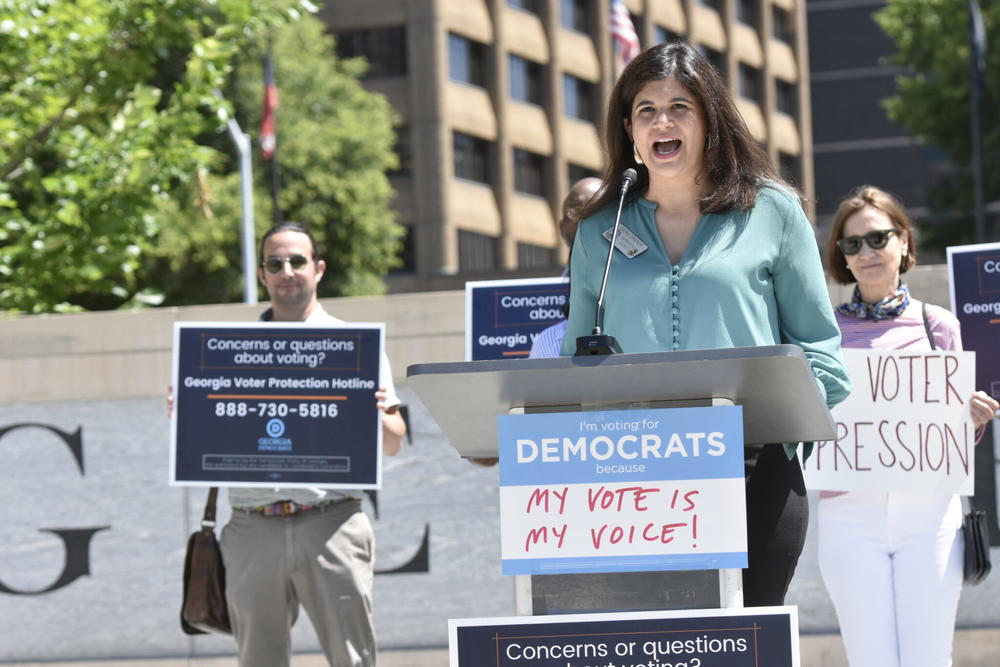
Caption
Rep. Saira Draper speaks at a press conference raising concerns about potential mass voter challenges.
Credit: Ross Williams/Georgia Recorder

Rep. Saira Draper speaks at a press conference raising concerns about potential mass voter challenges.
Georgia Democrats are sounding the alarm over potential mass voter challenges ahead of the November election.
Georgia law allows local voters to challenge the eligibility of as many people as they want if they suspect the person is ineligible to cast a ballot. Ahead of the January 2021 runoffs for the U.S. Senate, a conservative vote monitoring group called True the Vote challenged hundreds of thousands of voters’ eligibility.
In a ruling this January, a federal judge said he could not condone “TTV’s actions in facilitating a mass number of seemingly frivolous challenges” but could not “under the operative legal framework say that these actions were contrary to Georgia law.”
Atlanta Democratic Rep. Saira Draper, who is also an attorney and voting rights advocate, said Democrats expect even more challenges this year because of two controversial voting laws passed since the last presidential election.
Senate Bill 202, passed in 2021, clarified that there is no legal limit on the number of voter challenges one can make, and Senate Bill 189, signed by Gov. Brian Kemp earlier this month, outlines possible reasons to challenge eligibility.
“We know that right wing activists are planning to make voter challenges a big part of their electoral strategy for this presidential election,” she said at a Thursday press conference outside the state Capitol. “In fact, they are using a software that they developed called Eagle AI that allows a challenger to file thousands of meritless voter challenges at a time with just a few clicks of a mouse. And they are actively recruiting people to use this tool across our state.”
Candace Smith, an Atlanta attorney, said her eligibility was improperly challenged ahead of last week’s primary election.
Smith said she has lived at the same address for more than 20 years and voted in nearly every election since 1993, but when she logged onto her voter page on the secretary of state’s website last Tuesday, she saw her voter registration had been challenged.
“No reason was given for the challenge at all,” she said. “It said the reason for the challenge is blank, and I was directed to contact my county elections office for more information. I have been a Georgia voter for decades and as a result this was pretty shocking.”
Smith said she was able to get the problem resolved and ensure her vote was counted, but she worries that others who don’t have the same time or tenacity might not be able to.
“A voter who doesn’t have the time or the resources to resolve a challenge to the registration might simply give up and go home or not leave the house at all,” she said. “For many, just receiving this intimidating message, whether in error or otherwise, may keep them from voting again.”
Speaking to the Recorder after the press conference, Draper expressed confidence that the results of this year’s elections will be fair, even if that involves going to court.
“In the outcome of the 2020 election, there were dozens of lawsuits that were filed over ballots that had been cast, and those lawsuits were speedily resolved to show that the elections in Georgia were valid,” she said. “So we certainly have the traditional process at our disposal that we can use if we deem that we need to. But part of what we are talking about now is preventative action that we can take with organizing and education with voters so that we can hopefully prevent any of that from happening before it starts. And I think having that two-tier approach is very important.”
“Of course, we’re going to use all the options that are available to us,” she added. “But balancing the messaging and this narrative about the importance of the integrity of elections, we have to consider that in any kind of action that we’ll take because accepting the outcome of legitimate elections is absolutely critical for democracy.”
In an email, Mike Hassinger, spokesman for the Georgia Secretary of State’s office, challenged Draper’s characterization of state law and said remarks like Draper’s are often used to fire up voters and raise money.
“Georgia’s ‘voter challenge’ law has been on the books since the early 1980s,” he said. “Prior to this year’s session of the General Assembly, it had virtually no guidance about the process by which anyone can challenge the right of an elector to be listed on a voter registration list. Anyone could challenge the eligibility of any voter, for any reason, at any time. Section 5 of SB 189 defines what can be considered probable cause for bringing a voter challenge (such as a registered voter being deceased, being registered in another jurisdiction, claiming a homestead exemption in another jurisdiction, being registered at a non-residential address as confirmed by a government office or database or publicly available source derived solely from such governmental sources). It also specifies that any voter challenges brought within 45 days of an election will not be considered until after the election.”
“Eligibility challenges are handled at the County level by the local election boards and require both notification of the challenged voter and a public hearing. We urge Georgians to check their voter registration status and information nearly every day,” he added. “They may have changed names, gotten married, or moved within the state and need to bring their voter registration information up to date. That’s what the MVP.SOS.GA.GOV page is for, and we routinely remind voters to check their status.”
This story comes to GPB through a reporting partnership with Georgia Recorder.